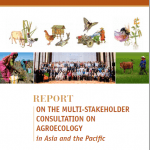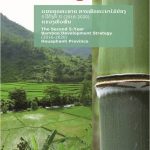
11 downloads
Title of document: Report on the Multi-Stakeholder Consultation on Agroecology in Asia and the Pacific, FAO, Authors: FAO Ministry/Government Agency/Organization: FAO Year of publication: 2016 Geographic focus: Asia and the Pacific Seeking to gain a better understanding of the role that agroecology can play in eradicating hunger and malnutrition, FAO organized the International Symposium on agroecology for Food Security and Nutrition in September 2014 in Rome, Italy, followed by three regional meetings in Asia and the Pacific, sub-Saharan Africa and Latin America and the Caribbean. The Multistakeholder Consultation on agroecology for Asia and the Pacific was held in Bangkok, Thailand on 24-26 November 2015. FAO acted as a facilitator to enable debates and foster collaboration among a variety of actors in order to advance science, knowledge, public policies, programmes and experiences on agroecology, supporting the strengthening of the already-extensive evidence-based knowledge for agroecological approaches in agriculture. The participants in this meeting, representatives of governments, civil society, including peasants, fisherfolks, pastoralists, urban communities, indigenous peoples, women’s organizations, youth and others, academia, and private sector, issued recommendations for the development of agroecology in Asia and the Pacific after two days of discussion. Read More
58 downloads
Title of document: Agroecology Transition in Myanmar: Issues, Status and Stakeholder Mapping Authors: San Thein and Aung Thin Ministry/Government Agency/Organization: GRET / Village Integrated Development Association (VIDA) Year of publication: 2016 Geographic focus: Myanmar This report on situation review of agro ecological transition in Myanmar is the follow up feasibility study (Consultation workshop on agro ecology, held at Yangon, on 12 June 2013) with the support of Groupe de Recherche et d’Echanges Technologiques (GRET) conducting a stock taking of practices, actors, success stories and constraints to adoption of agro ecology principles in Myanmar agriculture sector. This study aims at further mapping agro ecological initiatives at local, state-divisional and national level. The paper is divided into three parts: the first part explains background context, the second reviews the policy and legal framework promoting or restricting the agro ecological activities and the third part is the explanation of six schools of agro ecological activities at country level, divisional (provisional) and local level and their linkages finally followed by brief discussion of allies and champions in respective activities. Read More

79 downloads
Title of document: The second 5 year bamboo development strategy (2016-2020), Houaphanh Province Authors: The Provincial Bamboo Task Force supported by GRET Ministry/Government Agency/Organization: Houaphan PAFO & DPI Year of publication: 2015 Geographic focus: Laos The first 5-year Bamboo Development Strategy (2010-2015) has been implemented by the Authorities of Houaphanh Province and of the three Districts of Sam Neua, Viengxay & Sobbao with the support of the Bamboo Project operated GRET and SNV. The value chain approach adopted during the first phase proved effective for mobilizing stakeholders (villagers, traders, investors, government staffs) around five bamboo based value chains: handicraft & furniture (Khouane, Hok, Luang bamboo species) and fresh bamboo shoots (Khom species) for the domestic market and dried bamboo shoots (Hok species), paper pulp (Xang species) and slats & sticks (Khouane species) for the Vietnamese market. Based on the lessons learned from the first phase, a multi level consultation has been organized by the provincial and district authorities in cooperation with the Bamboo Task Force and Gret between May and July 2015. The first phase was estimated to be quite successful, as compared to its original objectives. A second 5-year Bamboo Development Strategy (2016-2020) was then designed, with the following targets : • 5 000 Households involved in bamboo activities (1800 Households in 2015) • Expand the allocation natural bamboo forests to villagers, forest management plans and forest monitoring activities in 10-30 new villages or 5 000 ha (26 villages and 3400 ha managed in 2015) • Generate USD 1,0 million from domestic trade and exports of bamboo products (USD 450 000 generated in 2010-2015) Read More
51 downloads
Title of document: Situation review of agro-ecology initiatives, stakeholders and networks in Lao PDR Authors: Phengkhouane Manivong and Souliyouan Viengkhamsone gte mso 9]>--> Ministry/Government Agency/Organization: GRET / Faculty of Agriculture Year of publication: 2016 Geographic focus: Laos The Situation review of agro-ecology initiatives, stakeholders and networks in Lao PDR reports the information and data on the six most significant agro-ecological practice/schools (SRI, CA, Organic Agriculture, IPM, Agroforestry and VAC/Integrated farming) collected between October to December 2015. It provides a current status of the policy framework, the stakeholders, the initiatives and the achievements related to the agro-ecology in Lao PDR. A desk review combined with interviews and field visits was used for this study. Read More
62 downloads
Title of document: Agroecological farming innovations: Case studies in Hoa Binh and Lam Dong province, Vietnam Authors: Pham Van Hoi & Ngo The An Ministry/Government Agency/Organization: GRET/CARES Year of publication: 2016 Geographic focus: Vietnam Given the increasing scope and impacts of environmental pollution and food poisonings in Vietnam since its agricultural sector started with further intensification with more chemical inputs used especially pesticides since early 1990s; increasing opportunity for agricultural exports; and more awareness of governments on importance of agricultural sector as well as agricultural exports which has contributed significantly to national economy since early 2010s, numerous important policies have been formulated to boost agricultural development towards more sustainable, notably on efforts of reduction of pesticide uses. This consultancy mission is a small part of the AFD project which aims at increasing the credibility and visibility of agro-ecology practices towards small-holder farmers as well as other relevant stakeholders such as consumers, policy makers, and private actors. Based on the firsthand information gathered from professional network and government websites, Hoa Binh and Lam Dong were selected for field study in which numerous AE innovative farmers were identified and interviewed for their exisiting farming practices and underlying reasons for restructuring their farms towards more ecological orientation. Read More
69 downloads
Case study's fact sheet: Agroforestry for livelihoods of smallholder farmers in Northwest Viet Nam Organizations: ICRAF researchers, 31 households, District extension centres In practice since: 2011 Geographic focus: Vietnam School of agroecology: Agroforestry >>> See on map Read More
4 downloads
Case study's fact sheet: Farmer - Agroforestery Civil society organizations: individual In practice since: 2006 Geographic focus: Vietnam School of agroecology: Agroforestry >>> See on map Read More
92 downloads
Title of document: Agroecology Stakeholder Mapping and Situation Review in Cambodia Authors: Proyuth Ly and Samphiron Sar Ministry/Government Agency/Organization: GRET Year of publication: 2016 Geographic focus: Cambodia The current report presented results from a study on agroecology stakeholder mapping and situation review in Cambodia conducted within the framework of AFD’s funded regional project “Toward Agroecology Transition in the Mekong Region”, implemented by GRET. The study is one of the four studies, conducted in parallel in four countries including Cambodia, Lao PDR, Myanmar and Vietnam. The overall objective of the study is to map agroecological initiatives at local and national level and provide a more detailed and accurate account of ongoing initiatives promoting agroecology across the region. The study involves desk reviews including national policy framework, technical reports, articles, books addressing the six identified agroecological practices (SRI, IPM, Organic Agriculture, Integrated Farming, Conservation Agriculture and Agroforestry), interviews with 21 actors actively promoting agro-ecological practices, and field visits to the outstanding sites in four provinces (Kampong Speu, Kandal, Takeo and Siem Reap). The results of the study is divided into five sections: a review of Cambodia’s policy/regulatory frameworks addressing agro-ecological practices, sustainable development, poverty reduction, food security, GI, GAP etc.; status of the six identified agroecological practices and enabling environment; stakeholder mapping and their account of ongoing initiatives; existing networks promoting agroecology; and stories from the fields. Read More
142 downloads
Case study's fact sheet: Sacha Inchi Project Government: PAFO-LPB In practice since: 2013 Geographic focus: Laos School of agroecology: Agro-forestry >>> See on map Read More
32 downloads
Title of document: Regulation on the Control of Pesticides in Lao PDR Ministry/Government Agency/Organisation: Ministry of Agriculture and Forestry, Lao PDR Year of publication: 2010 Geographic focus: Laos - Pursuant to the Law on Agriculture No.01/98/NA, dated 6 November 1998; - Pursuant to the Environment Protection Law No.02/99/NA, dated 3 April 1999; - Pursuant to Law on Local Administration No.03/NA of 21 October 2003; - Pursuant to the Law on Food No.04/NA, dated 15 May 2004. Read More

 Asia & Mekong Region
Asia & Mekong Region  Cambodia
Cambodia  Laos
Laos  Myanmar
Myanmar  Other
Other  Vietnam
Vietnam